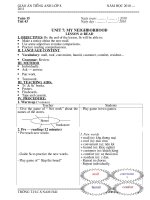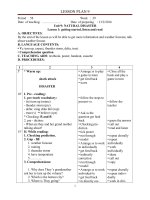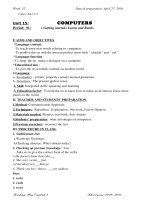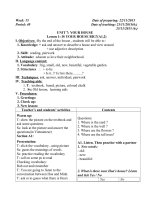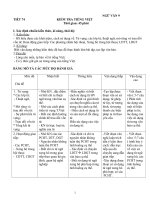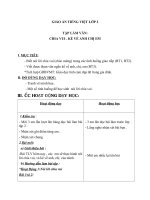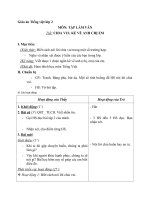tiếng anh 9 tuần 15
Bạn đang xem bản rút gọn của tài liệu. Xem và tải ngay bản đầy đủ của tài liệu tại đây (183.9 KB, 14 trang )
<span class='text_page_counter'>(1)</span><div class='page_container' data-page=1>
<b>Unit 5: the media</b>
<b>I.Trọng tâm kiến thức, kỹ năng:</b>
<b>1. Topic: the media</b>
<b>2. Competences:</b>
- Expressing agreement and disagreement
- Asking for and giving opinions
<b>3.Skills:</b>
- Speaking: Ask for and give opinions; Express agreement and disagreement; Talk
about the development and the use of the media, especially the Internet
- Listening: Listen to monologues / dialogues within 130-150 words for general or
specific information.
- Reading: Read passages within 150-180 words for general or detailed information
- Writing: Write a passage within 80-100 words expressing opinions based on a
model and guidelines given
<b>4. Grammar:</b>
- Tag questions
- Gerunds after some verbs: like doing, enjoy doing
<b>5. Vocabulary:</b>
- Words to talk about the media: history, development, different uses.
</div>
<span class='text_page_counter'>(2)</span><div class='page_container' data-page=2>
<b>II. Unit plan:</b>
<b>Unit 1: The media (6 periods)</b>
Period 1 : Getting started + Listen and read
Period 2: Speak
Period 3: Listen
Period 4: Read
Period 5: Write
Period 6: Language focus
<b>Date of preparing: 23/11/2019 Period 27</b>
<b> Unit 5: the media</b>
<b>Lesson 1: getting started- listen and read</b>
<b>A.Objectives:</b>
<b>1. Aims:</b>
- Talk about means of media and review gerunds after some verbs.
- By the end of the leson, students can be able to talk about means of media and
review gerunds after some verbs.
</div>
<span class='text_page_counter'>(3)</span><div class='page_container' data-page=3>
<b>+ Advanced knowledge: Answer some questions about the text, Use gerunds after</b>
some verbs and write about their friends' activities...
<b>+ Basic language:</b>
- Vocabulary: shout, appear, media, variety, channel, means, benefit, interractive
- structure: Gerund after some verbs.
<b>2. Practice skill: </b>
- practice the comprehension reading skill, listening and speaking skills.
<b>3. Attitude:</b>
- Help ss to have good consciousness in order to practice reading for detalis,
doing some exercises.
<b>B. Teaching- aids: </b>
Book, posters, tape and cassette recorder….
<b>C. Methods:</b>
- Model-Talk-Practice, individual work, pair work
- Some techniques can be used: Slap the board, Pre-questions, Gap-filling,
Brainstorming, Survey.
<b>D. Procedure :</b>
<i><b>I.Organization: (1')</b></i>
</div>
<span class='text_page_counter'>(4)</span><div class='page_container' data-page=4>
<b>Class</b> <b>Date of teaching</b> <b>Absent ss</b>
<b>9A</b> <i><b> 27/11/2019</b></i>
<i><b>II.Warmer:+Brainstorming: (4')</b></i>
? What are your favorite activities? watching TV
- T model, divide class into 2 groups
- Ss write their favorite activities on bb reading newspaper
in groups with different color chalks
- T get feedback from ss & praise the winner.
<i><b>III. New lesson:</b></i>
<b>Step 1: Pre-listening & reading.(10')</b>
+
<b> Preteach</b>
Picture
Picture
Realia
Action
Translation
Situation
- T elicit, ss guess the meaning
- T model, ss read in chorus then
some individually, T correct
pronunciation
T check stress, meaning, kind of words
and ask ss to copy down
<b>I. Vocabulary</b>
- crier ( n ) người rao tn
- viewer ( n ) Khán giả
- remote control ( n ) Điều khiển từ xa
- shout ( v ) thong báo, kêu to
- interactve ( adj ) tương tác
- beneft ( n ) lợi ích
- variety (n) := many
- channel : kênh
- appear : xuất hiện
favorite actvites
Người rao
</div>
<span class='text_page_counter'>(5)</span><div class='page_container' data-page=5>
+
<b> Slap the board</b>
- Which team has more points - >
win
- T praise the winner
+
<b> Pre-questions</b>
- T use pictures P.40,41 to set the scene
- T give 2 qts, ask ss to answer them
without looking at the book
<b>Step 2: While-listening & reading. </b>
<b>(19')</b>
+
<b> Activity 1</b>
- Ss listen to the tape to check their
answers
- Listen & read again & again to
answer
+
<b> Activity2 : Gap-fill</b>
?Look at exer a P.41
- T run through, ask ss to read the texts
<b>II.Reading:</b>
<i><b>1. Pre-questios</b></i>
1. What benefts does TV bring about to
people?
2. What was a town crier?
<i>Answer Key:</i>
1. What benefts does TV bring about to
people?
- People can get the latest informaton
and enjoy interestng and inexpensive
local and internatonal programs in a
convenient way.
2. What was a town crier?
- A town crier was a person whose job
was to go through the city streets ringing
a bell to shout the latest news as he was
walking.
<i><b>2.Exercise a P.41</b></i>
®điều khiển từ xa
</div>
<span class='text_page_counter'>(6)</span><div class='page_container' data-page=6>
again to complete the table
individually- > compare with partners
- T ask ss to call out their letters, ask
others to correct
+
<b> Activity 3 : Comprehension </b>
<b>questions</b>
? Look at exer b P.42
- T run through, ask ss to read the texts
again to answer the qts in pairs then
pairs compare
- T ask some pairs to ask & answer
before class, others give feedback &
correct
<i>*Look at " B" P. 41 & read it again? In </i>
<i>Vietnam, What do people love?</i>
( Ss pick out the model sentence with
gerund )
? How is it formed? meaning? stress?
what is it used for?- T elicit some
other verbs followed by gerunds
<b>*Activity 4 : Put the verb in to correct </b>
form
1- D 3 - B 5- A
2- B 4- C 6- D
<i><b>3.Exercise b P.42</b></i>
1. A town crier was a person whose job
was to go through city streets ringing a
bell to shout the lastest news as he was
walking.
2. The " Kien thuc ngay nay" is one of the
most popular magazines and is widely
read by both teenagers and adults.
3. People can get the lastest informaton
and enjoy interestng and inexpensive
local and internatonal programs in a
convenient way.
4. ss' answer
5. Ss' answer
<b>III.Grammar:</b>
<b> People love reading....</b>
</div>
<span class='text_page_counter'>(7)</span><div class='page_container' data-page=7>
<b>- ask ss to work in pairs then go to the </b>
board to do.
<b>Step 3: Post-listening & reading. (9')</b>
<b>+ Survey</b>
- T elicit from ss then write on bb
- Elicit the qts from ss
- Divide class into groups of 4, ss work
in groups asking for information then
fill in the survey
? Give the feedback, please?
1.I spent most of tme on ( learn) ...
2. I don’t like (borrow)... money
from my friends.
3.Would you mind ( help) me to move
this chair?
4. I am looking forward to ( hear) ...
from you.
5 . People love (read) books.
6.I hate( go) out at night.
<b>IV.Practice:</b>
Name What ...like
doing?
How many
hours...?
Ha watching TV 2-3 hours
Eg:
S1: What do you like doing in your free
tme?
S2: I like watching TV
S1: How many hours a week do you
spend watching TV?
S2:....
Eg:
</div>
<span class='text_page_counter'>(8)</span><div class='page_container' data-page=8>
She spends 2 or 3 hours a week to
watching TV.
<i><b>IV. Summary:(1')</b></i>
- What do you learn today? Are TVs and newspapers useful? Why?
<i><b>V. Homework:(1')</b></i>
- Do all exer again, learn new words.
- Write a short passage about one of the friends you've surveyed.
- Prepare Lesson 2- Speaking.
<b>*Evaluation</b>
<b>Date of preparing: 25/11/2019 Period 28</b>
<b> Unit 5: the media</b>
<b>Lesson 2: speak</b>
<b>A.Objectives:</b>
</div>
<span class='text_page_counter'>(9)</span><div class='page_container' data-page=9>
- Practice speaking about the programs that they like or dislike and get used to
question tag with ordinary verbs.
- By the end of the lesson, sts will be able to speak about the programs that they
like or dislike and get used to question tag with ordinary verbs.
<b>+ Standard knowledge: Practice speaking about the programs that they like or </b>
dislike and get used to question tag with ordinary verbs
<b>+ Advanced knowledge: Write about their friends.</b>
<b>+ Basic language:</b>
- Structure: Question tag
- Vocabulary: documentary, violent, major, informative
<b>2. Practice skill: </b>
- practice speaking skill and writing skill.
<b>3. Attitude:</b>
- Help ss to have attitude to find the suitable ways to learn English best for
themselves.
<b>B. Teaching- aids: </b>
- Book, posters ….
<b>C. Methods:</b>
- Model-Talk-Practice, individual work, pair work
</div>
<span class='text_page_counter'>(10)</span><div class='page_container' data-page=10>
<b>D. Procedure:</b>
<i><b>I.Organization: (1')</b></i>
<b>-</b> Greeting: Good morning!
<b>-</b> Who’s absent today?
<b>Class</b> <b>Date of teaching</b> <b>Absent ss</b>
<b>9A</b> <i><b> 30/11/2019</b></i>
<i><b>II.Warmer:(3')</b></i>
? Read “Listen and Read” again and answer the questions?
( Page 40, 41, 42)
<i><b>III. New lesson:</b></i>
<b>Step 1: Pre-speaking: (11')</b>
<b>+Preteach</b>
Situaton
Example
Translaton
- T follow steps of teaching vocab
+
<b> Rub out & remember</b>
- T follow steps of ROR
+
<b> Presentation grammar/o Dialogue </b>
<b>built</b>
<b>I. Vocabulary</b>
- violent ( adj ): bạo lực
- documentary ( n ): Phim tài liệu
- informative ( adj ): giàu thông tin
- major (adj) : chủ yếu
- boring (adj) : buồn
- foreign film (n): phim nước ngoài
<b>II. Grammar</b>
<b>*Tag questions</b>
</div>
<span class='text_page_counter'>(11)</span><div class='page_container' data-page=11>
Lien Trung
L: You like watching sports, ...?
T: No, I don't. I like documentaries. You
don't like them, ...?
L: Yes, I do. I prefer documentaries.
T: You watch the news,...?
L: Yes, everyday. It's very informatve.
T: I enjoy it too. You don't like foreign
flms
...?
L: No, I don't.
- T elicit, ss guess, T model, ss read afer
- T - Ss - > ss- ss - > pairs
- Ask ss to fll in the gaps
? Look at " do you/ don't you"? What is
it? stress? What is it in Vietnamese? Do
we write it in full form? When do we
raise/ fall the voice? Can we use
personal name here?
- Look at the dial P. 42? When T/ L
agrees or disagrees, what does he/ she
say?
<b>Step 2: While-speaking: (18')</b>
+
<b> Activity 1 : Word- cue-drill</b>
- T run through cues & model
- câu phủ định, đuôi phủ định
: không thực sự muốn hỏi, chỉ muốn
nghe đồng ý
: là câu hỏi sự
- in tags: use personal pronoun, not
names
<i>+Agreement</i>
- I prefer documentaries.
- I love watching sports.
- I enjoy it too.
<i>+ Disagreement</i>
- Not really.
- I don't like watching sports.
- I'm the opposite.
<b>III. Speaking</b>
Example exchange
S1: Lan enjoys walking, doesn't she?
S2: Yes, she does.
</div>
<span class='text_page_counter'>(12)</span><div class='page_container' data-page=12>
-T-ss, ss-ss pairs ( open- close ) use
tag qts to practse
1. Lan/ enjoy walking ( v )
2. You/ hate cooking ( x )
3. Hai/ like watching flms ( v )
4. They/ love cartoons ( x )
5. I/ watch the News now ( v )
<b>+Activity 2: </b>
- T run through the Daily Television
Guide
- T model with a ss, ask some pairs to
work in open - > ss work in close pairs
- T go round to help & monitor
<b>Step 3: Post-speaking ( 10' )</b>
<b>+Write it up</b>
? Write what TV programs your friend
likes or dislikes
S2: Yes, you are.
<b>IV.Writing</b>
<i>Eg: </i>
Tam likes watching cartoons
because they are interesting. She doesn't
like films because they make her sleepy.
<i><b>IV. Summary: (1')</b></i>
When do we use tag questions? What do we notice when using tag qts?
<i><b>V. Homework:(1')</b></i>
Write one dialogue you' ve made in your notebook.
Revise all the lessons you have learned.
<b>*Evaluation:</b>
</div>
<span class='text_page_counter'>(13)</span><div class='page_container' data-page=13></div>
<span class='text_page_counter'>(14)</span><div class='page_container' data-page=14></div>
<!--links-->
